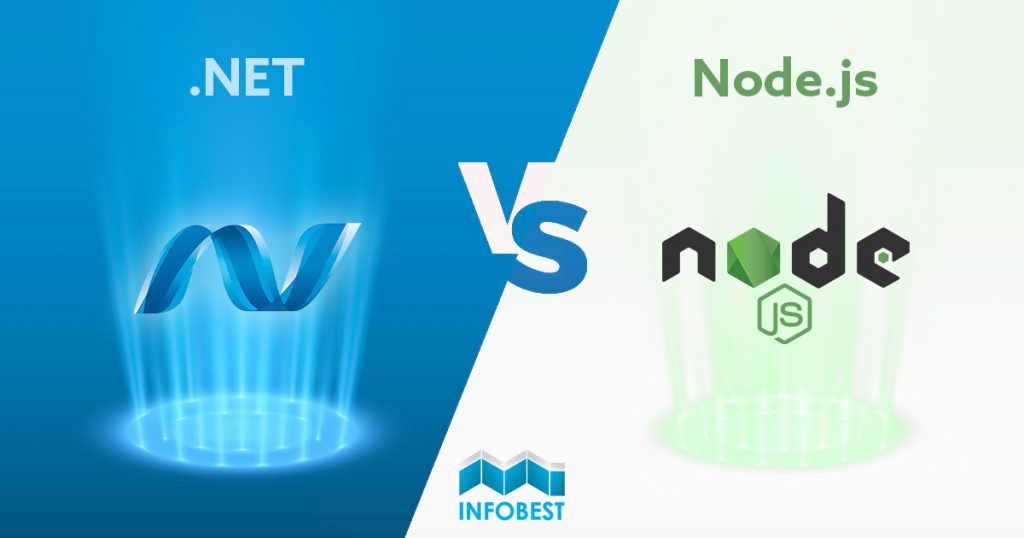In the dynamic arena of web development, the choice of a technology stack plays a pivotal role in shaping the trajectory of your software projects. Two prominent contenders in the server-side development landscape are .NET and Node.js, each with its unique strengths and characteristics. In this article, we will embark on a comprehensive exploration of these technologies, delving into their advantages, use cases and performance attributes. Whether you’re a seasoned developer or a business visionary navigating the complexities of software development, this guide aims to provide valuable insights to help you make an informed decision.
Understanding Node.js: An Overview
Let’s embark on a succinct introduction to Node.js, a framework built on innovation and adaptability. Built on Chrome’s V8 JavaScript engine, Node.js has gained immense popularity for its event-driven, non-blocking I/O model. This unique architecture not only facilitates the creation of scalable apps but also empowers developers with the flexibility to handle data-intensive tasks, microservices, and real-time web and mobile applications. In 2024, Node.js development continues to thrive, with an ever-growing community and a vibrant ecosystem that fosters innovation and collaboration.
Node.js is a platform-agnostic JavaScript runtime that enables developers to build fast, scalable network applications. Its event-driven, non-blocking I/O model ensures applications are efficient and responsive, capable of running in browsers, servers, cloud environments, or mobile devices. The lightweight and efficient nature of Node.js, coupled with a vast ecosystem of modules and libraries, makes it a top choice for handling data-intensive tasks and real-time applications.
Advantages of Using Node.js
High Performance
Node.js excels in high-performance scenarios, thanks to its event-driven, non-blocking architecture. It utilizes a single-threaded event loop, allowing it to handle a large number of concurrent connections efficiently. This makes Node.js ideal for building real-time applications like chat applications, online gaming platforms, and collaborative tools.
Scalability
Node.js is well-suited for scalable applications with many concurrent users. Its asynchronous and non-blocking I/O model enables it to handle multiple requests concurrently without getting blocked by I/O operations. This scalability makes Node.js suitable for social media platforms, e-commerce websites, and online marketplaces.
Rich Ecosystem
The Node.js development ecosystem is vibrant and thriving, offering a vast array of modules, libraries, and tools. The Node Package Manager (npm) is a cornerstone of this ecosystem, enabling easy access to pre-built packages and dependencies. This rich ecosystem enhances development speed and convenience.
Quick Development Cycle
Node.js promotes a rapid development cycle, allowing developers to iterate quickly and bring products to market faster. Its JavaScript-based syntax, coupled with a vast selection of libraries, empowers developers to build prototypes swiftly and experiment with new ideas efficiently.
Community and Support
Node.js boasts an extensive and passionate community of enthusiasts who actively contribute to its growth. The community provides resources, forums, online communities, and tutorials, fostering collaboration and knowledge sharing.
Cross-Platform Compatibility
Node.js is cross-platform, running on various operating systems such as Windows, macOS, and Linux. This flexibility allows developers to build applications that can run on different platforms with minimal changes to the code.
Optimal Applications for Node.js
Node.js shines in scenarios where the emphasis is on harnessing JavaScript for dynamic web development. Designed for versatility, it allows for significant capability expansion, making the platform universally applicable. Particularly adept at real-time data processing and consumption, Node.js is the preferred choice for projects requiring swift, multi-user, real-time data scenarios. Entrepreneurs value Node.js for its agility, making it suitable for both extensive applications and smaller, lightweight projects.

.NET & ASP.NET Overview
Now, let’s shift our focus to .NET, Microsoft’s robust and versatile framework that has been a reliable choice for enterprise-level solutions for decades. With the introduction of .NET 5 and subsequent updates, Microsoft has embraced open-source principles, allowing development teams to utilize it across multiple platforms.
ASP.NET, introduced in 2002, stands as an open-source web application framework from Microsoft. Renowned for its efficiency, accuracy in architecture, and alignment with the latest agile software development techniques, ASP.NET has evolved into a comprehensive platform for building web applications. With a well-defined structure, modularity, and cross-platform support, ASP.NET remains a stalwart choice for high-performance web services, APIs, and intricate business applications.
ASP.NET provides a powerful and flexible architecture, enabling the creation of modular web applications. This architecture facilitates easier maintenance, updates, and faster development times, while its support for various technologies adds versatility to the platform. The platform’s scalability and cross-platform compatibility make it a robust contender in the .NET vs Node.js debate.
Advantages of Using .NET
Possibility of Separation of Concerns
.NET’s architecture promotes the separation of concerns, with features like the Model-View-Controller (MVC) design pattern. This allows for a clear separation of business logic, presentation logic, and data access, enhancing maintainability and scalability.
Reduced Coding Time
.NET provides a wide range of tools, libraries, and frameworks that enable developers to build applications more quickly and efficiently. Code reusability, built-in libraries, and a large developer community contribute to reduced coding time.
Power and Flexibility
.NET is a powerful framework supporting various programming languages such as C#, F#, and Visual Basic. It allows seamless integration with other Microsoft technologies and third-party libraries, providing flexibility in choosing components and tools.
Customization and Extensibility
.NET allows for customization and extensibility, supporting the creation of custom modules, libraries, and APIs. This flexibility enables developers to tailor applications to specific requirements and integrate with other systems or services.
Security
.NET offers robust security features, including authentication, authorization, and role-based access control (RBAC). It supports industry-standard security protocols and encryption techniques, ensuring the security of data and applications.
Manageability
.NET offers powerful tools and frameworks for managing applications, including extensive debugging, profiling, and performance analysis capabilities. It also supports versioning, deployment, and configuration management, making it easier to manage and maintain applications throughout their lifecycle.
Continuous Monitoring
.NET provides robust monitoring and diagnostics capabilities, allowing developers to monitor applications’ performance, health, and availability in real-time. This helps identify and resolve issues quickly, ensuring smooth and reliable operation.
Cross-Platform Migration
With the introduction of .NET Core, .NET has become a cross-platform framework that can run on Windows, Linux, and macOS. This allows for easy migration of applications across different platforms, providing flexibility and scalability in deployment options.
Ideal Use Cases for .NET
The .NET platform is the go-to choice for projects requiring a diverse range of programming languages, libraries, and editors to develop websites, web and mobile applications, and games. Powering entities like StackOverflow, Microsoft, and Dell, .NET showcases its robust capabilities. In the realm of desktop applications, it boasts examples like Visual Studio, Reflector, and GNOME Do. Trusted by diverse industries, including Chipotle, UPS, GoDaddy, Asgard Systems, Siemens Healthineers, and more, .NET proves its mettle for projects demanding a powerful and flexible framework with a successful track record in enterprise-level solutions.

Conclusion: Choosing Between .NET and Node.js
The decision between .NET and Node.js depends on various factors, such as the nature of the project, scalability requirements, and developer preferences. Node.js excels in scenarios that demand high performance and scalability, especially for real-time applications. On the other hand, .NET offers a robust and versatile framework, particularly suitable for enterprise-level solutions, with a strong emphasis on security and manageability.
As a leading software development outsourcing company, we understand the nuances of both technologies. If you need professional advice or want to discuss the intricacies of developing web applications using .NET or Node.js, feel free to contact our expert team at Infobest. We specialize in providing adaptable web solutions that align with your unique project requirements. Our expertise spans from developing scalable Node.js applications to implementing complex projects in .NET development.



